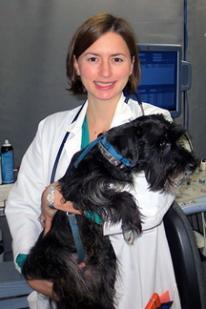
Urinary stones composed of calcium oxalate (CaOx) are common in dogs. Certain canine breeds have a strikingly high prevalence of disease, while others appear protected. For example, the miniature schnauzer and bichon frise have greater than 20 times the risk of developing CaOx stones compared to mixed breed dogs. Other commonly affected breeds include the shih tzu, lhasa apso, pomeranian, poodle (miniature and toy), dachshund, and terrier (e.g. Yorkshire, Cairn, Jack Russell).
Study goals

These breed predispositions strongly support underlying genetic risk factors for the disease. Our project currently involves the collection of DNA samples from dogs with a history of CaOx stones (cases) and dogs that have never formed this stone type (controls). We aim to compare the DNA of these two groups to identify genetic determinants of the disease. An understanding of the pathophysiology of CaOx stones is fundamental to the development therapeutic and preventative strategies in canine breeds.
Hereditary calcium oxalate urolithiasis, types 1 & 2

The Canine Genetics Lab is proud to announce the development of genetic tests for Hereditary Calcium Oxalate Urolithiasis, Type 1 & Type 2. Hereditary Calcium Oxalate Urolithiasis, Type 1 (CaOx1) and Type 2 (CaOx2), are two different autosomal recessive genetic disorders that greatly increase the risk for formation of CaOx urinary (bladder or kidney) stones. CaOx1 is caused by a mutation in a protein that is excreted in the urine and is important to preventing crystal formation. CaOx2 is caused by a mutation in a protein that transports electrolytes between the urine and kidney cells.
These disorders are rare across the dog population as a whole, but both are common causes of CaOx urinary stones in English bulldogs.
Additional breeds affected are:
CaOx1 mutation - American Staffordshire terrier, border collie, Boston terrier, bullmastiff, Havanese, rottweiler, and Staffordshire bull terrier
CaOx2 mutation - American bulldog, basset hound, beagle, bullmastiff, and English mastiff
We believe that these mutations are likely present in additional breeds, especially those related to the bulldog lineage. If you are interested in testing a breed not listed here, you are welcome to contact us first at [email protected] to obtain information on the likelihood that the mutation exists in your breed of interest.
Study information
Dogs* with CaOx stones diagnosed at age 5 years or younger are eligible to participate. We would love a small DNA sample that can be collected either at home with cheek swabs or by a veterinarian as a blood sample. It can be sent in from anywhere in the United States. If you are interested in participating, we can send you cheek swab kits or a shipping label at no cost. Please contact us at [email protected].
*For American bulldogs, basset hounds, beagles, Boston terriers, bullmastiffs, English bulldogs, English mastiffs, rottweilers, and Staffordshires we recommend genetic testing for CaOx1 and/or CaOx2.
Related links
Minnesota Urolith Center
Learn more about the work of the Minnesota Urolith Center, which has received more than one million bladder stones for diagnosis and strives to minimize pain and avoid invasive surgery.
U of M Veterinary Medical Center's urology service
Funding
This study has received previous support from the Morris Animal Foundation.
About the investigator

Dr. Eva Furrow is a Small Animal Internist and Associate Professor at the University of Minnesota College of Veterinary Medicine and co-director of the Minnesota Urolith Center. She first became interested in the genetic basis of canine diseases when she was an undergraduate at Harvard University. She was offered a summer position in the section of Medical Genetics at the University of Pennsylvania. One of her roles that summer included assistance in a study on the genetic muscular disease myotonia congenita in miniature schnauzers. Dr. Furrow later attended the University of Pennsylvania Veterinary School where a NIH-Merck grant enabled her to continue research on genetic diseases. Dr. Furrow completed her Internal Medicine residency and PhD at the University of Minnesota and is currently a member of the Canine Genetics Laboratory. Dr. Furrow's ultimate goal is to find better ways to prevent and treat genetic diseases. She also has a personal attachment to one of the high-risk breeds, as her parents-in-law have always had miniature schnauzers.